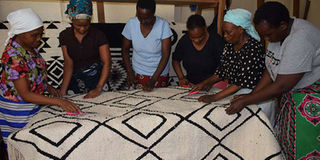How weaving is changing lives in Kilifi

Imani Collective Ltd staff in Kilifi County weave a mat. The company has employed 50 artisans. PHOTO | NATION MEDIA GROUP
What you need to know:
- Imani Collective sells hand-crafted gifts and targets modern-day decor with its uniquely designed and handmade souvenirs.
- The centre aims at offering employment to as many people as possible, as well as grow to become a global brand.
In the remote village of Mtepeni in Kilifi County, tens of women are engaged in production business.
And although they trade with locals, much of their products are sold abroad.
With no formal education but a willing-to-learn spirit, these women have successfully removed themselves from the roadside fruits hawking to weaving and stitching high quality products under the mentorship and training of Jenny Nuccio.
Jenny invited 16 women to her newly-opened workshop Imani Collectives, and taught them how to stitch and sew using locally available materials.
Today, the number of artisans who are making a decent living from Imani Collectives has risen to 50, and includes men.
PORTFOLIO
Imani Collective sells hand-crafted gifts and targets modern-day decor with its uniquely designed and handmade souvenirs.
Their portfolio includes handmade throw pillows, clutches, bracelets, tote bags, rugs, journals and blankets. All these are sold in Kenya, USA, Netherlands and Israel.
They also enjoy walk-in clients from many other countries, who are mostly vacationers touring the ancient town. Currently, their wares are priced between Sh250 and Sh56,000.
“Our shop is very different from most souvenir shops in Old town. We incorporate Kitenge fabric in our products, but also stay on neutral pallets for products that are targeting the modern day woman who wishes to blend them with other pieces she may have in her house,” says Femida Otieno, the Country Director.
Their pillows are made using recycled threads, rugs made from sheep’s wool sourced from Kijabe and blankets woven from locally-sourced cotton.
THEMES
They also make animal-themed pillows for children in different patterns and forms including giraffes, llamas and sloths.
Journals are made of paper from Lake Victoria’s hyacinth and leather from Limuru. All these products can personalised with love messages or people’s names.
During a visit to the workshop, we met 30-year-old Deborah Nzisa making a table runner using macramé art, which entails crafting decoration materials using threads in an ornamental knotting form.
The beautiful table runner made from cotton cords hangs beautifully on the knotting board as she did some final touches to the decorative piece.
She tells us that this particular piece has taken her three days to make.
EMPLOYMENT
Years ago, Nzisa, who is physically handicapped, was unemployed and desperately looking for a job.
“None of the organisations that I applied for a job ever got back to me, and that was very discouraging. When a friend told me that Imani Collective was offering a job opportunity in crocheting, I decided to try them, and thankfully I was taken in,” she says.
Nzisa started with crocheting scarfs, weaving and now she has perfected macramé art. She wants to learn basic computer skills and would love to go back to college for that.
We also met John Muriithi who has been at the centre for three years and is specialised in making shawls. “In a day I can make about six to seven,” he tells us.
Muriithi uses a wooden machine to weave the shawls, and informs us that he also knows how to make and repair the machine because of his vast 35-year experience.
CONSISTENCY
According to Otieno, the employees do not have formal education, which made it hard for them to secure formal employment.
Now that they are equipped with artisanal skills, they can work and make reasonable income to take care of their families.
Nuccio says the journey has not been easy. “We travelled to the States (US) for an exhibition and those we met said that Africa has good products but fails in consistency. We had to train our members on how to make high quality products consistently.
"We want to break the notion that Africa cannot produce consistently good handmade items,” says Nuccio, who is keen on ensuring that all their products meet international standards.
She also had to teach some members English, so that they can communicate well with their buyers. They have also been taught other vital skills such as investing.
GROWTH
The art of sewing and weaving has been ignored by the young people and locally sourced materials are sometimes inadequate, but Imani collectives is determined to make sure that this skill is preserved for posterity.
They are encouraged by the increase in demand for their products, and they now have plans to buy spinning machines and carders to prepare wool for use as textile.
The centre aims at offering employment to as many people as possible, as well as grow to become a global brand.
“We have a Dallas branch which we use as our marketing office. Locally, we have noticed that participating in exhibitions and artisans' markets has greatly helped us reach local customers. We also rely on social media platforms such as Instagram where we have more than 10,000 followers,” says Otieno.




